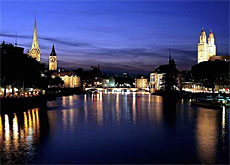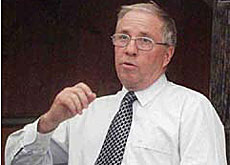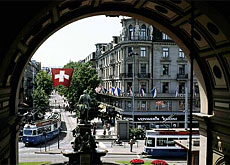Zurich vote seen as litmus test of general election

This weekend's regional elections in canton Zurich are being seen as indicator of voting intentions in October's general election.
Switzerland’s most populous canton has been hard hit by the economic slowdown, and is seeing a wider polarisation of political views.
As well as the Zurich vote, elections are also taking place in Lucerne, Ticino and Appenzell Outer Rhodes.
Attention will be focusing on the performance of the right-wing Swiss People’s Party, which did well in last weekend’s city election in Geneva and in the cantonal vote in Basel Country.
The size of Zurich’s population, its blend of rural and urban voters, and its apparent reflection of national trends during the last cantonal election here will likely see the Zurich results dominate the national pages of Monday’s newspapers.
Four years ago, the biggest winner in Zurich was the People’s Party which gained 20 seats in the 1999 vote to take up exactly one third of the 180-member regional parliament.
Power base
Although the canton had long been a power base for the party and its main figurehead, Christoph Blocher, the political swing – mainly at the expense of centre-right rivals in the Radical Party – was remarkable and led to expectations of similar successes for the party at the national level.
Six months later those expectations were fulfilled with the People’s Party surging to take almost a quarter of the national vote in the October 1999 general election.
With an accompanying allocation of 44 seats in the House of Representatives, the party had climbed above the Radicals to become the second biggest faction in the House (behind the centre-left Social Democrats).
Unsurprisingly, many political analysts will now be looking at this weekend’s vote in Zurich to see if Switzerland’s rightwing is waxing or waning.
Speculation
Interesting though such speculation might be, Switzerland’s particular emphasis on cantonal autonomy ensures that regional election results cannot necessarily be taken as a clear indication of how people will vote nationally.
As well as weighing up issues of national importance, the people of Zurich are likely to have plenty of local concerns in mind as they cast their votes this weekend.
“Cantonal issues have been to the fore in the build up to the election,” argues political observer, Iwan Rickenbacher. “The debate over [noise levels at] Zurich airport for example is one major theme in the campaigning which has only an indirect significance at the national level.
“There are similarly a number of issues that are likely to play key roles in the national elections, such as asylum questions or pension reforms neither of which have been particular talking points in the Zurich campaign.”
Just as in the regional parliament, Zurich’s cantonal government contains a right-of-centre majority with the People’s Party and Radical Party currently sharing four of the seven seats between them.
Incumbent
Six of the canton’s seven councillors are seeking re-election this weekend and are unlikely to be disappointed – it’s now 40 years since the Zurich electorate last rejected an incumbent councillor.
However, the decision of Christian Democrat Ernst Buschor to stand down means that there will be at least one new face in the executive by Monday.
All recent polls suggest that the Social Democrats, whose strength lies traditionally in the canton’s urban districts, will be the ones to benefit. National parliamentarian Regine Aeppli is widely tipped to replace Buschor and ensure the presence of three centre-left councillors.
That would make for the largest left-wing minority in the Zurich government since the 1940s – possibly paving the way for some political fireworks both within the executive itself and in its dealings with the parliamentary right-wingers.
Less controversially, Aeppli’s likely entrance into the government would also mark a milestone for women in Swiss politics. Barring any major upsets, Aeppli will join the existing three female councillors to make Zurich the first Swiss canton ever to be governed by a majority of women.
swissinfo, Ariane Gigon Bormann and Mark Ledsom

In compliance with the JTI standards
More: SWI swissinfo.ch certified by the Journalism Trust Initiative


You can find an overview of ongoing debates with our journalists here . Please join us!
If you want to start a conversation about a topic raised in this article or want to report factual errors, email us at english@swissinfo.ch.